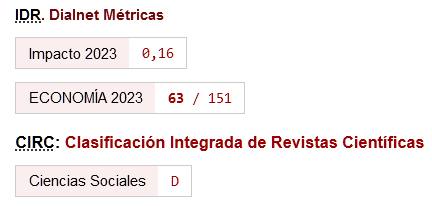La Reducción del Tiempo de Trabajo en la Actual Crisis Orgánica: Una propuesta desde el Post-Marxismo y la Economía Política Radical
Palabras clave:
Estructuras Sociales de acumulación, hegemonía, Laclau, crisis orgánicaResumen
El presente artículo hace uso de la teoría de las Estructuras Sociales de Acumulación para discernir las causas de la actual crisis orgánica de la economía española, en base a un análisis de las dinámicas estructurales que la han gobernado en el período 1995-2007. La teoría concluye que debería dar lugar a un largo período de recomposición institucional. Sin embargo, los términos en que se desarrollará la contienda política están relativamente subdesarrollados. Con tal motivo, el presente artículo hará uso de las teorías de la hegemonía y el populismo del pensador argentino Ernesto Laclau para argumentar a favor de la demanda por la reducción del tiempo de trabajo como potencial polo constitutivo de un nuevo sujeto transformador, en base a argumentos de naturaleza tanto económica como política.
Descargas
Citas
Althusser, Louis (1965) For Marx. London: Verso.
Banyuls, Josep; Miguélez, Fausto; Recio, Albert; Cano, Ernest; Lorente, Raul (2009) "The transformation of the employment system in Spain: Towards a Mediterranean neoliberalism?", en Gerhard Bosch, Steffen Lehndorff y Jill Rubery (eds.) European Employment Models in Flux: A comparison of institutional change in nine European countries. London: Palgrave, pp. 247-269.
https://doi.org/10.1057/9780230237001_10
Bowles, Samuel; Gordon, David, y Weisskopf, Thomas (1990) After the Waste Land. Democratic Economics for the year 2000. New York: Routledge.
Butler, Judith; Laclau, Ernesto, y Žižek, Slavoj (2000) Contingency, hegemony, universality, London: Verso.
Cano, Ernest (2007) "La extensión de la precariedad laboral como norma social", Sociedad y Utopía, No 29, pp. 117-138.
Charnock, Craig; Purcell, Thomas; Ribera-Fumaz, Ramón (2014). The Limits to Capital in Spain. Crisis and Revolt in the European South. New York: Palgrave.
https://doi.org/10.1057/9781137319944
Gordon, David, Edwards, Richard y Reich, Michael (1982). Trabajo segmentado, trabajadores divididos. Madrid: Ministerio de Trabajo, 1986.
Gorz, André (1989) Critique of Economic Reason, London: Verso.
Husson, Michel (2015) "Unemployment, working time and financialisation: the French case'. Cambridge Journal of Economics Vol. 39 (3), pp. 887-905.
https://doi.org/10.1093/cje/bet051
Kotz, David (1994) "Interpreting the Social Structures of Accumulation Theory" en Kotz et al. (1994), pp. 50-71.
https://doi.org/10.1017/CBO9780511559501.004
Kotz, David (2003) "Neoliberalism and the Social Structure of Accumulation Theory of Long-Run Capital Accumulation" Review of Radical Political Economics Vol. 35 (3), pp. 263-70.
https://doi.org/10.1177/0486613403255542
Kotz, David (2009) "Economic Crises and Institutional Structures: A Comparison of Regulated and Neoliberal Capitalism in the US" en Jonathan Goldstein y Michael Hillard (eds.) Heterodox Macroeconomics: Keynes, Marx, and Globalization, New York: Routledge, pp. 176-188.
Kotz, David (2010) "Financialization and Neoliberalism" en Gary Teeple y Stephen McBride (eds.) Relations of Global Power: Neoliberal Order and Disorder, Toronto: University of Toronto Press, pp. 1-18.
https://doi.org/10.3138/9781442694620-003
Kotz, David (2013) "Social Structures of Accumulation, the rate of profit and economic crises" en Jeannette Wicks-Lim y Robert Pollin (eds.) Capitalism on trial: Explorations in the tradition of Thomas E. Weisskopf , Cheltenham: Edward Elgar, pp. 335-350.
https://doi.org/10.4337/9781782540854.00036
Kotz, David; McDonough, Terrence y Reich, Michael (eds.) (1994) Social atructures of accumulation. The political economy of growth and crisis, New York: Cambridge University Press.
https://doi.org/10.1017/CBO9780511559501
Kotz, David, y Wolfson, Martin (2010) "A reconceptualization of Social Structures of Accumulation theory', en McDonough et al. (2010), pp. 72-92.
https://doi.org/10.1017/CBO9780511804335.004
Laclau, Ernesto (2005) On Populist Reason, London: Verso.
Lippit, Victor (1997) "The Reconstruction of a Social Structure of Accumulation in the United States", Review of Radical Political Economics Vol. 29 (3), pp. 11-21.
https://doi.org/10.1177/048661349702900302
Lippit, Victor (2005) Capitalism, New York: Routledge.
Lippit, Victor (2010) "Social Structure of Accumulation Theory" en McDonough et al. (2010), pp. 45-71.
https://doi.org/10.1017/CBO9780511804335.003
Lippit, Victor (2014) "The Neoliberal and the Financial Crisis in the Light of SSA Theory", Review of Radical Political Economics, Vol. 46 (2), pp. 141-161.
https://doi.org/10.1177/0486613413497908
López, Isidro y Rodríguez, Emmanuel (2010) Fin de ciclo. Financiarización, territorio y sociedad en la onda larga del capitalism hispano (1959-2010), Madrid: Traficantes de Sueños.
López, Isidro y Rodríguez, Emmanuel (2011) "Del auge al colapso. El modelo financier-inmobiliario de la economía española (1995-2007)", Revista de Economía Crítica, Vol. 12, pp. 39-63.
Mateo, Juan Pablo (2014) "Las causas de la crisis económica en España", Laberinto Nº 42, pp. 83- 95.
Mateo, Juan Pablo y Montanya, Miguel (2014) "Acumulación de capital y burbuja inmobiliaria en España" Ponencia presentada en XIV Jornadas de Economía Crítica, Valladolid.
McDonough, Terrence (2003) "What does Long Wave Theory have to contribute to the debate on globalization?", Review of Radical Political Economics, No 35 (3), pp. 280-286.
https://doi.org/10.1177/0486613403255547
McDonough, Terrence, Reich, Michael y Kotz, David (eds.) (2010) Contemporary capitalism and its crises. Social structures of accumulation for the 21st century. New York: Cambridge University Press.
https://doi.org/10.1017/CBO9780511804335
Miguélez, Fausto; Prieto, Carlos (2009) "Transformaciones del empleo, flexibilidad y relaciones laborales en Europa", Política y Sociedad, No 46 (1), pp. 275-287.
Murillo, Francisco Javier (2010) "Impacto salarial del milagro económico español, 1994-2007", Análisis Económico, No 59 (25), pp. 179-204.
Recio, Albert y Banyuls, Josep (2004) "Employment without technology. The paradox of the Spanish labour market", Economia et Lavoro, No 38 (1), pp. 115-137.
Reich, Michael (1997) "Social Structure of Accumulation Theory: Retrospect and Prospect", Review of Radical Political Economics, No 29 (3), pp. 1-10.
https://doi.org/10.1177/048661349702900301
Resnick, Stephen y Wolff, Richard (1987) Knowledge and Class. A Marxian critique of political economy, Chicago: University of Chicago Pres.
Rey Araújo, Pedro María (2015) "Institutional change in the systemic crisis of Neoliberalism: Radical political economics and Post-Marxism", Documentos de trabajo IDEGA-USC, No 59, Análise Económica.
Rosenberg, Samuel (2010) "Labor in the Contemporary Social Structure of Accumulation", en McDonough et al (2010), pp. 195-214.
https://doi.org/10.1017/CBO9780511804335.009
Streeck, Wolfgang (1997) "Beneficial constraints. On the economic limits of rational voluntarism", en J. Rogers Hollingsworth y Robert Boyer (eds) Contemporary capitalism: the embeddedness of institutions, Cambridge: Cambridge University Press, pp. 197-219.
https://doi.org/10.1017/CBO9781139174701.008
Thomassen, Lasse (2005) "Antagonism, Hegemony and Ideology after Heterogeneity", Journal of Political Ideologies, No 10 (3), pp. 289-309.
https://doi.org/10.1080/13569310500244313
Toharia, Luis (ed.) (2005) El problema de la temporalidad en España: Un diagnóstico, Madrid: Ministerio de Trabajo y Asuntos Sociales.
Wolfson, Martin (2003) "Neoliberalism and the Social Structure of Accumulation', Review of Radical Political Economics, No 35 (3), pp. 255-262.
https://doi.org/10.1177/0486613403255538
Žižek, Slavoj (2000) "Class struggle or postmodernism? Yes, please!", en Butler et al (2000), pp. 90-136.
Descargas
Publicado
Cómo citar
Número
Sección
Licencia
Esta licencia permite a terceros compartir (copiar y redistribuir el material en cualquier medio o formato) y adaptar (remezclar, transformar y crear a partir del material para cualquier finalidad, incluso comercial), siempre que se reconozca la autoría y la primera publicación en esta revista (La Revista, DOI de la obra), se proporcione un enlace a la licencia y se indique si se han realizado cambios en la obra.







